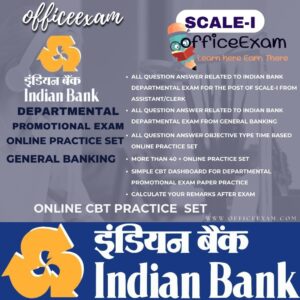Description
The JAIIB exam, an acronym for Junior Associate of the Indian Institute of Bankers, serves as a cornerstone for banking professionals in India seeking to boost their proficiency and career growth. Conducted by the esteemed Indian Institute of Banking and Finance (IIBF), the exam encapsulates a wide array of topics, including intricate banking laws and regulations, comprehensive accounting and finance principles, along with general banking knowledge. This evaluation platform has been meticulously designed to equip banking professionals with the skills and knowledge to execute their duties proficiently.
Benefits of the JAIIB Examination
- Monetary benefits
-
-
- If you pass the JAIIB Examination and are employed as a bank clerk, you will earn one increment
- You will be eligible for one increment if you pass the JAIIB test given by the IIBF while employed as an officer with a nationalized bank
-
- Non-monetary benefits
-
- After reading the JAIIB course outline, you will be able to get a thorough understanding of both the practical and technical components of banking in India
- Since the JAIIB credentials have some weight in the promotional interview, having them makes it simpler for you to acquire promotions.
All Objective multiple question answer related to JAIIB From Exam Principles and Practices of Banking (PPB)
Question Related to following Topic
| Banker-Customer Relationship |
| AML- KYC Guidelines |
| Operational Aspects of KYC |
| Opening Accounts of Various Types of Customers |
| Operational Aspects of Deposit Accounts |
| Operational Aspects of Handling Clearing/Collection/Cash |
| Banker’s Special Relationship |
| Foreign Exchange Remittance Facilities for Individuals |
| Operational Aspects of NRI Business |
| Foreign Currency Accounts for Residents and Other Aspects |
| Cash Management Services and its Importance |
| Payment and Collection of Cheques and Other Negotiable Instruments |
| Responsibility of Paying Bank |
| Responsibility for Collecting Bank |
| Bank Ancillary Services |
| Financial Inclusion & Financial Literacy |
| Customer Service Guidelines |
| Duties & Rights of a Banker and Customer Rights |
| Grievance Redressal & RBI Integrated Ombudsman Scheme 2021 |
| The Consumer Protection Act, 2019: Preamble, Extent and Definitions |
| The Right to Information Act 2005 |
| Principles of Lending, Different Types of Borrowers, and Types of Credit Facilities |
| Appraisal and Assessment of Credit Facilities |
| Operational Aspects of Loan Accounts |
| Types of Collaterals and Their Characteristics |
| Different Modes of Charging Securities |
| Documentation |
| Non-Performing Assets/Stressed Assets |
| Important Laws Relating to Recoveries of Dues |
| Contracts of Indemnity |
| Contract of Guarantee & Bank Guarantee |
| Letters of Credit |
| Deferred Payment Guarantee |
| Laws Relating to Bill Finance |
| Personal Finance |
| Priority Sector Advances |
| Agricultural Finance |
| Finance to MFIs/Co-Lending Arrangements with NBFCs |
| Micro Small and Medium Enterprises in India |
| Government Sponsored Schemes |
| Self-Help Groups |
| Essential of Bank Computerization |
| Operational Aspects of the CBS Environment |
| Alternate Delivery Channels – Digital Banking |
| Data Communication Network and EFT System |
| Digital Payment Systems – NPCI |
| Impact of Technology Adoption and Trends in Banking Technology |
| Security Considerations and Mitigation Measures in Banks |
| Operational Aspects of Cyber Crimes/Fraud Risk Management in Cyber Tech |
| Technology Trends in Banking, e-RUPI, Fintech – RegTech, SupTech, Hashtag Banking etc. |
| Ethics, Business Ethics & Banking: An Integrated Perspective |
| Ethics at the Individual Level |
| Ethical Dimensional: Employees |
| Work Ethics and the Workplace |
| Banking Ethics: Challenging Dynamics |




